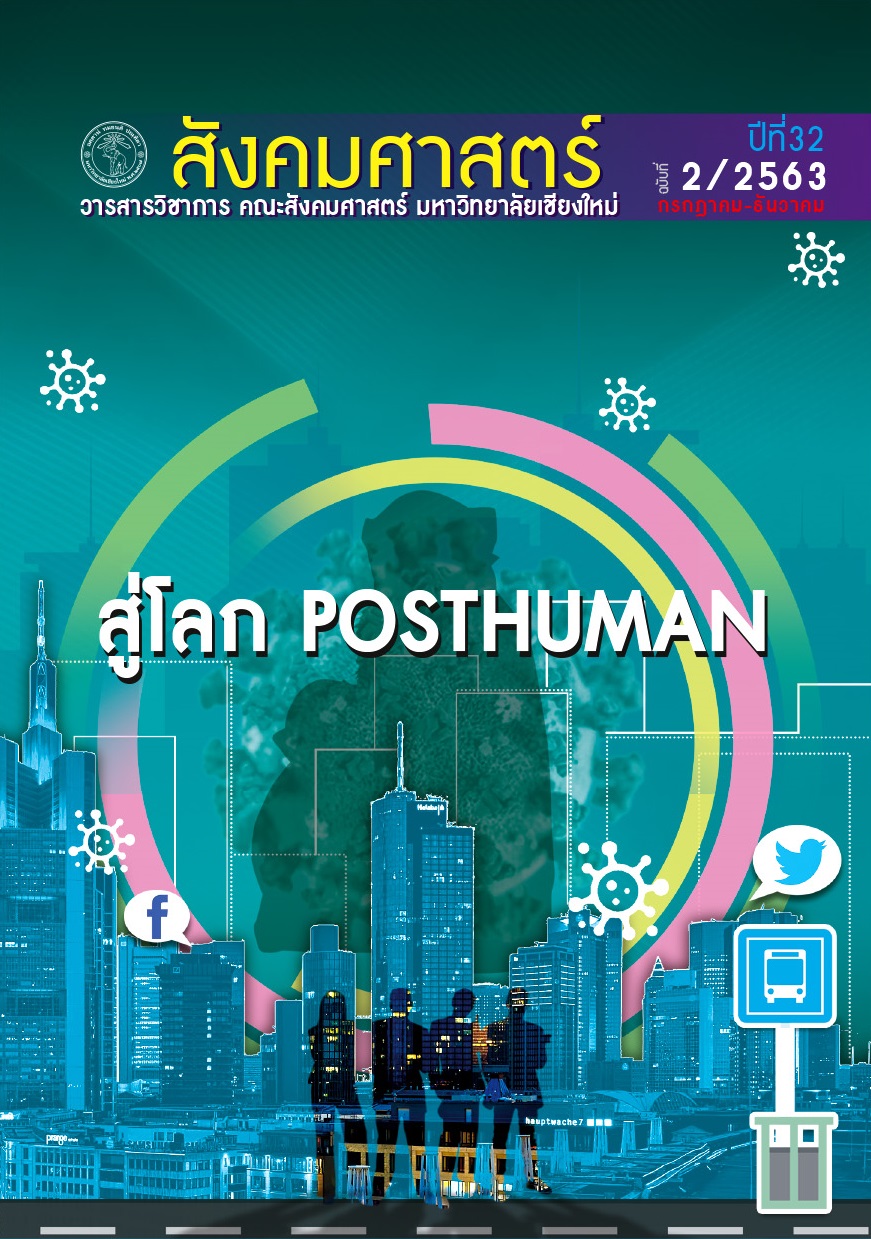เส้นชีวิตระหว่างลิงกังกับคนเลี้ยงลิง : สู่พื้นที่แบบหลังมนุษย์นิยมแห่งการอยู่อาศัยและการกลาย
Main Article Content
บทคัดย่อ
บทความนี้นำเสนอเรื่องราวระหว่างลิงกังกับลุงปอคนเลี้ยงลิงจากจังหวัดชุมพร ผู้ฝึกลิงกังให้ขึ้นมะพร้าวจนกลายเป็นอาชีพหลักราวห้าสิบปีก่อน ในช่วงธุรกิจการท่องเที่ยวเติบโต ลุงปอเดินทางไปยังจังหวัดภูเก็ตเพื่อแสดง “โชว์ลิง” ให้แก่นักท่องเที่ยวจีน จากนั้นย้ายมาจัดตั้ง “ศูนย์ฝึกลิง” ณ อำเภอแม่ริม จังหวัดเชียงใหม่ จากมุมมองเชิงภูมิศาสตร์หลังมนุษย์นิยม บทความนี้เน้นย้ำพลังชีวิตและความเป็นสัตว์ที่เอ่อล้นตลอดเส้นทางของการเดินทางจากภาคใต้สู่ภาคเหนือ และจากสวนมะพร้าวสู่ลานแสดง ลิงกังมิใช่เพียงแค่แรงงานสัตว์เพื่อความบันเทิงในธุรกิจท่องเที่ยวเชิงธรรมชาติเท่านั้น แต่เพราะเอกลักษณ์และความสามารถของลิงต่างหากที่ดึงสิ่งมีชีวิตและสิ่งของอื่น ๆ เข้าสู่ความสัมพันธ์จนสร้างพื้นที่แห่งการเลื่อนไหลและการกลาย ณ ศูนย์ฝึกลิง สถานที่ซึ่งสิ่งมีชีวิตผิดถิ่นถูกจัดแสดงเพื่อดึงดูดนักท่องเที่ยว เผยให้เห็นถึงกระบวนการกลายเป็นลิงแสดง และกระบวนการกลายเป็นคนเลี้ยงลิงอันเกิดจากการเรียนรู้ภาษากาย การส่งเสียงและการส่งสายตาระหว่างกันจนรู้ใจ รวมถึงการรับรู้ความตึงของเชือกผ่านการดึงหรือกระตุก นอกจากนั้น ด้วยบทแสดงและอุปกรณ์การแสดงทำให้ลิงกังที่เชียงใหม่มีพัฒนาการทางสรีระร่างกายและพฤติกรรมแตกต่างจากลิงที่ชุมพร ในขณะที่คนเลี้ยงลิงได้กลายเป็นผู้ประกอบการที่ต้องปรับตัวให้อยู่รอดภายใต้อำนาจของการทำให้เป็นเสรีนิยมใหม่ของธรรมชาติ
Article Details
ข้อเขียนทั้งหมดทีปรากฏในวารสารสังคมศาสตร์ เป็นความคิดเห็นของผู้เขียนโดยเฉพาะ มิใช่ทัศนคติของคณะสังคมศาสตร์ มหาวิทยาลัยเชียงใหม่ หรือกองบรรณาธิการวารสารสังคมศาสตร์
เอกสารอ้างอิง
กมเลศ โพธิกนิษฐ, พัชรินทร์ สิรสุนทร และ วัชรพล พุทธรักษา. 2560. “แรงงานข้ามชาติกับการทำให้เป็น “สัตว์-เศรษฐกิจ” ภายใต้ภาวะการถูกกดทับ: กรณีศึกษาแรงงานข้ามชาติในประเทศไทย.” วารสารสังคมศาสตร์ มหาวิทยาลัยนเรศวร. 13 (2): 99-119.
เก่งกิจ กิติเรียงลาภ. 2560. PERSPECTIVE: ภววิทยาแบบมุมมองนิยมและความเป็นซับเจค. เชียงใหม่: TURN.
จันทนี เจริญศรี. 2559. ศาสตร์ อศาสตร์: เข้ามาข้างนอก ออกไปข้างใน. นนทบุรี: ภาพพิมพ์.
ชยา วรรธนะภูติ และ รัตนาภรณ์ พุ่มน้อย. 2561. ““โลกพันทาง” ของลุ่มน้ำ ปลาและผู้คนแห่งบ้านกง อำเภอกงไกรลาศ จังหวัดสุโขทัย: มุมมองเชิงภูมิศาสตร์มนุษย์.” วารสารสังคมวิทยาและมานุษยวิทยา มหาวิทยาลัยธรรมศาสตร์. 37 (2): 125 - 156.
ชัยยศ ยงค์เจริญชัย. 2563. “การใช้ลิงขึ้นมะพร้าว ภูมิปัญญาตามวิถีชาวบ้านหรือการทรมานสัตว์.” BBC. 15 กันยายน 2563. https://www.bbc.com/thai/thailand-53763690
พนา กันธา. 2562. “พหุภววิทยาในโลกคู่ขนานระหว่างสัตว์กับมนุษย์.” วารสารสังคมศาสตร์ มหาวิทยาลัยนเรศวร. 13 (2): 5-24
จักรกริช สังขมณี. 2559. “ความไม่(เคย)เป็นสมัยใหม่ของศาสตร์-อศาสตร์: อวัตถุวิสัย อมนุษยนิยม และเครือข่าย-ผู้กระทำของบรูโน ลาตูร์.” ใน ศาสตร์ อศาสตร์: เข้ามาข้างนอก ออกไปข้างใน, บรรณาธิการโดย จันทนี เจริญศรี, 142-67. นนทบุรี: ภาพพิมพ์.
สุดแดน วิสุทธิลักษณ์. 2560. สิงสาราสัตว์ : มานุษยวิทยาว่าด้วยสัตว์และสัตว์ศึกษา. กรุงเทพ: คบไฟ.
สุรเดช โชติอุดมพันธ์. 2560. “สัตว์ศึกษา: โลกหลังภาพแทน.” ใน สิงสาราสัตว์ : มานุษยวิทยาว่าด้วยสัตว์และสัตว์ศึกษา, บรรณาธิการโดย สุดแดน วิสุทธิลักษณ์. 201-233. กรุงเทพ: คบไฟ.
Barua, Maan. 2014. “Circulating Elephants: Unpacking the Geographies of a Cosmopolitan Animal” Transactions of the Institute of British Geographers 39 (4): 559-573
Callon, Michel. 1986. “Some Elements of a Sociology of Translation: Domestication of the Scallops and the Fishermen of St Brieuc Bay.” In Power, Action and Belief: a new Sociology of Knowledge?, edited by John Law, 196-233. London: Routledge & Kegan Paul.
Country, Bawaka, S. Wright, S. Suchet-Pearson, K. Lloyd, L. Burarrwanga, R. Ganambarr, M. Ganambarr-Stubbs, B. Ganambarr, and D. Maymuru. 2015. “Working With and Llearning from Country: Decentring Human Authority.” Cultural Geographies 22: 269-283.
Duffy, Rosaline and Lorraine. Moore. 2010. “Neoliberalising Nature? Elephant-Back Tourism in Thailand and Botswana.” Antipode 42 (3): 742-766.
Emel, J., C. Wilbert, and J. Wolch. 2002. “Animal Geographies.” Society & Animals 10 (4): 407-412.
Fuentes, Agustin. 2013. “Pets, Property, and Partners: Macaques as Commodities in the Human-Other Primate Interface.” In The Macaque Connection: Cooperation and Conflict between Humans and Macaques, edited by Sindhu Radhakrishna, Michael A.Huffman, and Anindya Sinha, 107-126. London: Springer.
Haraway, Donna. 2008. When species meet. Minneapolis: University of Minnesota Press.
Hinchliffe, Steve, Matthew B. Kearnes, Monica Degen, and Sarah Whatmore. 2005. "Urban Wild Things: A Cosmopolitical Experiment." Environment and Planning D: Society and Space 23: 643-658.
Ingold, Tim. 2000. The Perception of the Environment: Essays on Livelihood, Dwelling and Skill. London: Routledge.
Ingold, Tim. 2011. Being alive: essays on movement, knowledge and description. London: Routledge.
Ingold, Tim. 2015. The life of lines. London: Routledge.
Jones, Owain. 2003. “‘The restraint of Beasts’: Rurality, Animality, Actor Network Theory and Dwelling.” In Country Visions, edited by Paul Cloke, 283-303. Essex: Pearson.
Johnston, C. 2008. “Beyond the clearing: towards a dwelt animal geography.” Progress in Human Geography 32 (5): 633-649.
Sponsel, Leslie E, Poranee Natadecha-Sponsel and Nukul Ruttanadakul. 2004. “Coconut-picking Macaques in Southern Thailand: Economic, Cultural and Ecological Aspects.” In. Wildlife in Asia: Cultural perspective. Edited by John Knight, 112-128. London: Routledge.
Whatmore, Sarah. 2002. Hybrid Geographies: Natures, Cultures, Spaces. London: SAGE.
Whatmore, Sarah. 2006. "Materialist Returns: Practising Cultural Geography in and for a more-than-Human World." Cultural Geographies 13: 600-609.


